LOB clause can’t be invoked to deny benefit of Article 8 of DTAA to a Singapore shipping enterprise: ITAT
- Blog|News|International Tax|
- 2 Min Read
- By Taxmann
- |
- Last Updated on 5 December, 2022

Case Details: Maersk Tankers Singapore (P.) Ltd. v. ACIT - [2022] 145 taxmann.com 260 (Rajkot-Trib.)
Judiciary and Counsel Details
-
- T.R. Senthil Kumar, Judicial Member & Smt. Annapurna Gupta, Accountant Member
- Porus Kaka, Senior Advocate & Manish Kanth for the Appellant.
- Shramdeep Sinha, CIT D.R. & Sanjay Punglia, CIT D.R. for the Respondent.
Facts of the Case
Assessee-company was incorporated in Singapore and was engaged in the business of ship owning & operating, chartering, and related business. During the assessment year, it claimed exemption of the freight income as per Article 8 of DTAA between India and Singapore.
However, the Assessing Officer (AO) held that the assessee did not qualify for tax exemption under Article 8 of DTAA. AO held that the freight income was not directly remitted to Singapore. Thus, the provision of Article 24 comes into the picture, which overrides the provisions of Article 8, as the same limit the relief, in case of some double non-taxation of such income.
On appeal against the draft assessment order, the Dispute Resolution Panel (DRP) upheld the findings of AO. Aggrieved-assessee filed the instant appeal before the Tribunal.
ITAT Held
The Tribunal held that exemption to shipping profits under Article 8 of Indo-Singapore DTAA can’t be denied to Singapore resident shipping enterprise by invoking Article 24 of the said DTAA.
The moot question was whether the operation of Article 8 is ousted by virtue of Clause (1) of Article 24 (Limitation of Relief). Article 24(1) does not apply to the shipping income received by a Singapore Shipping Enterprise from Indian customers.
It has been clarified by Singapore Tax Authority i.e. IRAS that the shipping income is taxable in Singapore, on an arising basis when the income is earned by the shipping enterprise regardless of whether the shipping income is received in or remitted to Singapore. Since Article 24(1) is not applicable, the provisions of Article 8(1) should apply without any limitation.
Since the shipping profits derived by a Singapore resident shipping enterprise from the operation of ships in international traffic shall be taxable only in Singapore in accordance with Article 8(1) and the same cannot be taxed in India.
Disclaimer: The content/information published on the website is only for general information of the user and shall not be construed as legal advice. While the Taxmann has exercised reasonable efforts to ensure the veracity of information/content published, Taxmann shall be under no liability in any manner whatsoever for incorrect information, if any.

Taxmann Publications has a dedicated in-house Research & Editorial Team. This team consists of a team of Chartered Accountants, Company Secretaries, and Lawyers. This team works under the guidance and supervision of editor-in-chief Mr Rakesh Bhargava.
The Research and Editorial Team is responsible for developing reliable and accurate content for the readers. The team follows the six-sigma approach to achieve the benchmark of zero error in its publications and research platforms. The team ensures that the following publication guidelines are thoroughly followed while developing the content:
- The statutory material is obtained only from the authorized and reliable sources
- All the latest developments in the judicial and legislative fields are covered
- Prepare the analytical write-ups on current, controversial, and important issues to help the readers to understand the concept and its implications
- Every content published by Taxmann is complete, accurate and lucid
- All evidence-based statements are supported with proper reference to Section, Circular No., Notification No. or citations
- The golden rules of grammar, style and consistency are thoroughly followed
- Font and size that’s easy to read and remain consistent across all imprint and digital publications are applied



 CA | CS | CMA
CA | CS | CMA
